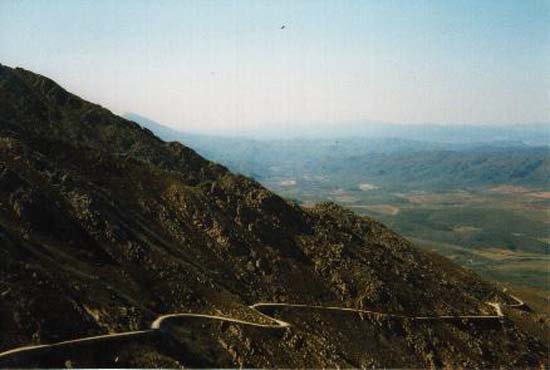
The initial diplomatic overtures for President Bill Clinton's visit to South Africa were made last year with the arrival of America's unofficial envoys, the Peace Corps.
Clinton's torch in rural SA
Email This Page
Print This Page
Mail & Guardian
March 27, 1998
Posted to the web March 27, 1998
Babak Dehghanpisheh
Johannesburg
The initial diplomatic overtures for President Bill Clinton's visit to South Africa were made last year with the arrival of America's unofficial envoys, the Peace Corps.
They include young Americans working among the poorest of the poor in rural South Africa. One of them, Marcus Watson (24), appears to have been groomed for such work from birth.
"I remember first hearing about South Africa at the age of 10 or 11, when my father did a consciousness-raising act by standing on his head every Wednesday during February [Black History Month] with signs saying 'Free South Africa'," says Watson, a New York native who will finish his term with the Peace Corps in 1999.
Born to a Muslim black father and a Jewish white mother, Watson says a large part of his beliefs was shaped by growing up with mixed parentage. "I realised early on that if I hate whites, then I'm hating my mother and part of myself - and if I hate blacks, then I hate my father and also part of myself."
Named after Marcus Garvey, Watson remembers having African influences around during most of his youth, from his parents and family friends, some of whom worked in Rwanda.
After completing university with a degree in history and political science, joining the Peace Corps and coming to Africa seemed like a natural choice.
The other volunteers don't have the same personal ties to Africa. Lorena Alvarez, a 29-year-old California native born to Mexican parents, says she knows a lot about Latin America but believes coming to Africa
is a way to broaden her horizons.
There are 28 of them in Northern Province, working with the provincial and national education departments to strengthen the link between schools and communities and to help upgrade teaching skills.
Earl Yates, Peace Corps director for South Africa, says the volunteers' placement was based on the recommendations of an assessment team sent out in early 1996 to confer with the government and NGOs. The team recommended the volunteers be placed in rural primary schools.
"That's where the greatest needs are, and where it's hardest to find qualified people to serve in high-demand positions," Yates says. "But, rather than saying 'here's what's wrong with your village, your society, your life and here's how we're going to fix it', we expect the community to have most of the answers."
Coping with the cultural and physical differences of rural life may be one of the hardest things volunteers have to face.
Often they are placed in remote areas with a single telephone line, limited electricity and a scarce water supply.
Despite his mixed heritage, Watson is also finding the cultural differences hard to adjust to. "It takes 20 minutes to walk from the paved road to my village [Motantantyane], but in this culture, since you must greet everyone you see and everyone who sees you, it takes 45 minutes.
"In my American head I'm thinking, 'C'mon, I've had a long day and I just want to get home and sleep,' but I'm wrong because I'm here."
Integrating into the community is a vital component of the three- month training period volunteers must undergo, which includes language and cultural training.
Despite recent charges of fraud and corruption in the Department of Education in the Northern Province, the volunteers say they haven't noticed it on a widespread level. But they have noticed there is a certain amount of disparity between schools.
"Something has to be happening to funds," says Alvarez. "I drive by schools in town and they're getting a lot of supplies, but we don't get any of that in the villages and townships. The schools even look different - Moime Primary School is practically falling apart."
Jermina Mashiane, principal of Mokone School, says she is impressed with the workshops given by Watson.
"After two days, we were able to develop missions and objectives to improve our situation. The teachers were very happy, and the students tried to improve their language by speaking to him in English."
The volunteers, too, say they believe the Peace Corps mission is worthwhile. "From Buffalo, New York, to Motantantyane was a step down technologically, but a step up socially - I think we can learn a lot about how to treat each other from the people living here," says Watson.
